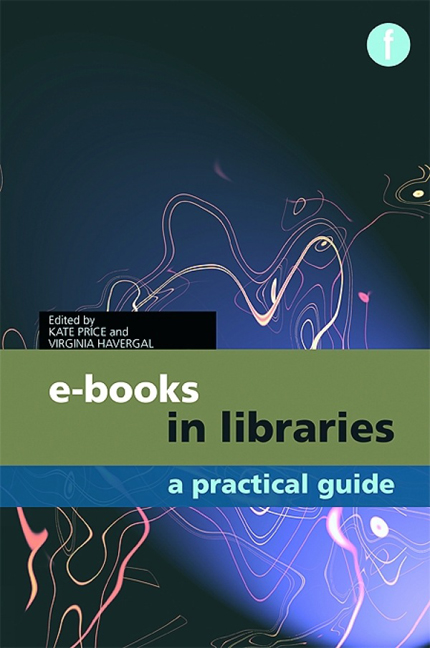Book contents
- Frontmatter
- Contents
- Preface
- The contributors
- Editors’ note
- Introduction
- Part 1 The production and distribution of e-books
- Part 2 Planning and developing an e-book collection
- Part 3 Delivering e-books to library users
- Part 4 Engaging readers with e-books
- 11 Public library users connecting with e-books
- 12 Engaging students with e-books in further education
- 13 Engaging staff and students with e-books in a university setting
- Part 5 The future of e-books
- Part 6 Useful information
12 - Engaging students with e-books in further education
from Part 4 - Engaging readers with e-books
Published online by Cambridge University Press: 08 June 2018
- Frontmatter
- Contents
- Preface
- The contributors
- Editors’ note
- Introduction
- Part 1 The production and distribution of e-books
- Part 2 Planning and developing an e-book collection
- Part 3 Delivering e-books to library users
- Part 4 Engaging readers with e-books
- 11 Public library users connecting with e-books
- 12 Engaging students with e-books in further education
- 13 Engaging staff and students with e-books in a university setting
- Part 5 The future of e-books
- Part 6 Useful information
Summary
Intoduction
This chapter examines the experiences of two FE colleges, City of Bristol College and Yeovil College, both situated in the west of England.
City of Bristol College has nearly 30,000 students based at six main centres across the city. As well as providing a full range of academic and vocational FE courses, the College works with five universities, including the University of Plymouth, to provide HE courses to 1200 students. Yeovil College has over 7000 students and has two main campuses situated in Yeovil, one of which is focused on the provision of HE courses, as well as two sites outside the town.
A range of strategies are used to engage students with e-books, including holding workshops and training sessions, embedding the use of e-formats into the curriculum, linking titles from the VLE, and verbal and visual promotion.
Engaging foundation degree students with e-books: the experience at City of Bristol College
This section draws on both the results produced and the experience gained during a research project which ran from February 2009 to February 2010. The aim of the project was to explore how e-books can effectively support HE students on foundation degree courses delivered in FE colleges. The project was funded by the Higher Education Learning Partnerships Centre for Excellence in Teaching and Learning's Award Holder scheme, which is based at the University of Plymouth.
There is a relatively small but increasing body of research on the impact of e-books on students, and on the LRCs and libraries supporting them. This is generally focused on students in HE, the two most comprehensive UK studies being the CIBER SuperBook project, a survey of students and staff with 1818 respondents carried out at University College London (Rowlands et al., 2007), and the JISC-funded UK National e-Books Observatory Project (JISC, 2009). Another recent research project was carried out by librarians at the University of the West of England, employing an online survey of students (Briddon et al., 2009).
- Type
- Chapter
- Information
- E-books in LibrariesA practical guide, pp. 217 - 236Publisher: FacetPrint publication year: 2011



